5 Best VPNs for China: Safe & Working in 2025
- Best VPNs for China — Full Analysis (Updated in 2025)
- Quick Comparison Table: China VPN Features
- Our Methodology for Choosing the Best VPN for China
- Quick Guide: How to Use a VPN in China in 3 Easy Steps
- Can I Download a VPN in China?
- What About Using a Free VPN in China?
- Troubleshooting Tips: What if My VPN Stops Working in China?
- Are VPNs Legal in China?
- FAQs on the Best China VPNs
- Get the Best VPN for China Today
China’s stringent internet regulations make it a constant challenge to freely access the open web — even with a VPN. The government’s Great Firewall (GFW) restricts a wide range of online content and constantly works to detect and block VPNs. Because of this, even the most reputable VPNs can sometimes be inaccessible and require ongoing updates to keep working in China.
After extensive research, we identified the ones that maintain stable and secure access in China. Our main focus was on strong obfuscation features and the ability to protect your data and privacy. We also assessed their networks, with particular interest in those offering servers in nearby countries. Most VPNs didn’t make the cut, either because they lacked the technologies or the specialty servers needed to work reliably in China.
The VPNs below stood out for their ability to slip encrypted connections past restrictive networks like the Great Firewall while keeping you safe online. They consistently helped us get more done on tightly controlled networks at school libraries and work than we ever could without a VPN. Each one offers robust privacy protections and nearby servers for faster performance and a smoother online experience. A few also provide ways to download their apps or reach customer support from within the country.
Best VPNs for China — Full Analysis (Updated in 2025)
1. ExpressVPN — Automatically Mask VPN Traffic to Maintain Stable Connections in China

Tested July 2025
| Best Feature | The only service on this list that automatically hides VPN use on every server |
| Nearby Locations | Hong Kong, Kazakhstan, Macau, Mongolia, Myanmar, Nepal, South Korea, Taiwan, Thailand, Vietnam |
| Security & Privacy | Perfect Forward Secrecy regularly assigns new encryption keys to secure your sessions |
| Works With | Netflix, Max, Facebook, Prime Video, HBO Go Asia, Snapchat, BBC iPlayer, YouTube TV, Yahoo, and more |
ExpressVPN keeps connections stable in China by automatically disguising VPN traffic through obfuscation whenever it detects restrictions. This makes it possible to browse popular websites and apps like Peacock, Google, and WhatsApp without interruptions. It also promptly replaces IP addresses if any are flagged to maintain consistent access. Both features work without requiring any manual configuration.
Even with obfuscation, ExpressVPN still offers impressive speeds across the network. When we connected to ExpressVPN’s nearby server on a restrictive network, there was a minor speed reduction of 11% (229.36Mbps). This is impressive since obfuscation can cause significant slowdowns. There was no buffering as we streamed HD and 4K content, including Fangs of Fortune on iQIYI and STRAW on Netflix.
 The speeds were consistently fast even on long-distance connections
The speeds were consistently fast even on long-distance connections
ExpressVPN actively monitors its network and keeps an updated list of servers that work best in China. You'll get reliable options in the US, UK, Japan, France, and Singapore to choose from. It suggests using the Automatic protocol for the obfuscation to work effectively. Plus, the app's Recommended tab highlights servers that are likely to work well with your current network conditions in China.
No VPN can promise 100% reliability in China, but ExpressVPN is one of the most dependable options available. There have been occasional reports of downtime, but the service quickly resolves any connectivity issues. Plus, all ExpressVPN offers include a 30-day money-back guarantee. This means you can test it without financial risk and get a refund if you’re not satisfied with the service.
Useful Features
- Chinese mirror site. Although its official website is blocked by the Great Firewall, ExpressVPN has a mirror website that’s accessible from within China. The URL changes constantly to avoid blocks, but you can always email its customer support to ask for an up-to-date mirror address or contact them through the 24/7 live chat.
- Privacy-focused. ExpressVPN is based in the British Virgin Islands (BVI), a privacy-friendly jurisdiction with no data retention laws. Plus, it has a strict no-logs policy to keep your activity private. It doesn’t operate servers in mainland China, which means it doesn’t have to comply with government requests for user data.
- Highly secure. Your data is protected by military-grade 256-bit encryption. Plus, you’ll get robust IPv4, IPv6, DNS, and WebRTC leak protection and a Network Lock kill switch to prevent anyone from seeing your real location.
- Advanced Protection. This is ExpressVPN’s customizable blocker. You can choose to prevent ads, malware, and trackers (or a combination) for a safer, more private way to browse in China. Switching on parental controls can also help you steer clear of adult content, as accessing porn sites in the country could land you in hot water.
- RAM-only servers (TrustedServer technology). ExpressVPN’s network is composed of memory-erasing servers. All data on them is wiped clean after each reboot.
- One of the fastest VPNs
- Works with top streaming sites
- A proven no-logs policy
- Limited customization
- Smart Location isn't always the fastest
2. Astrill VPN — Optimized Servers for Reliable Connections to Websites and Apps From China
| Best Feature | These servers are hosted in high-priority locations to reduce latency and network congestion |
|---|---|
| Nearby Locations | Hong Kong, Russia, South Korea, Taiwan, Thailand, Vietnam |
| Security & Privacy | Auto Clear Cookies lets Astrill erase all browser and flash cookies when you switch servers or activate the VPN |
| Works With | Max, HBO Go Asia, Telegram, BBC iPlayer, Google, X (Twitter), YouTube TV, and more |
Astrill VPN makes it easier to safely access apps and websites in China through its China-ready servers. Unlike standard options, these servers are optimized for high-speed performance under heavy restrictions. In our tests, we found them by simply typing “China Supercharged” into the search bar. The VPN also offers plenty of servers located near China for fast connections, along with Supercharged servers in the US and Hong Kong optimized for use in the country.
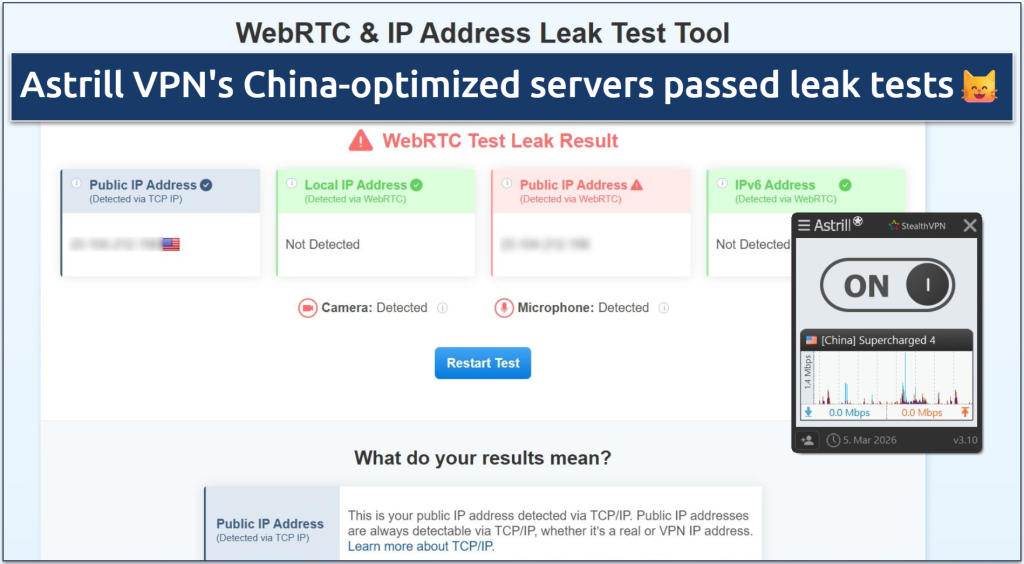 We saw the same results across the 30 standard servers we tested
We saw the same results across the 30 standard servers we tested
Plus, its Stealth VPN protocol conceals VPN use, similar to ExpressVPN’s automatic feature, so you can safely reach websites and apps like Hulu, Bet365, and Slack without interruptions. It even lets you tweak MTU values to make your data harder to detect.
It’s not as fast as ExpressVPN, but Astrill VPN delivers OK speeds for most online activities. Since obfuscation adds extra processing steps, some slowdown is expected. However, with its proprietary OpenWeb protocol, we experienced only a 27% drop on its Thailand server, down from 112 Mbps. That said, you may experience more noticeable speed reductions with its StealthVPN protocol, especially over longer distances.
While it doesn’t have a money-back guarantee, you can use Astrill VPN for free for 1 month if you refer a friend and they sign up for a paid option.
Useful Features
- Choice of 5 proxies. On the rare occasions that Astrill VPN isn’t working in China, you’ll have other options since it offers a selection of proxies, including HTTPS, SOCKS4a, and SOCKS5. Keep in mind that these won’t encrypt your traffic, though — I only recommend using them as a backup if you have no other option.
- Protect browsers only or all apps. Using the OpenWeb protocol, you can configure Astrill VPN to protect all apps or just web browsers. That’s useful if you want your non-browser apps to run faster in China.
- Customizable connections. Using OpenVPN, you can choose between 256-, 192-, and 128-bit encryption, and you can even turn off encryption completely. Turning your encryption level down could help to boost your speeds without sacrificing security. I don’t recommend turning it off in China, though.
- Dedicated IPs. For a little extra, you can get a dedicated IP that’s yours alone. I use them to skip the endless CAPTCHAs that come with shared IPs.
- Works in China
- Privacy-friendly
- High price
- Slow speeds
3. PrivateVPN — Customizable Security to Optimize Your Connection in China
| Best Feature | Adjust encryption levels to balance security and speed in China |
|---|---|
| Nearby Locations | Hong Kong, South Korea, Taiwan, Thailand, Vietnam |
| Security & Privacy | IPv6/DNS/WebRTC and kill switch prevent accidental exposure of your sensitive information |
| Works With | Netflix, Max, Prime Video, Asana, HBO Go Asia, BBC iPlayer, Telegram, and more |
PrivateVPN makes it easier to strike the right balance between security and speed in China. You can adjust encryption levels from AES 256-bit to 128-bit and configure the connection to use port 443, which helps maintain secure access even under strict restrictions. Switching PrivateVPN's encryption to 128-bit led to a decent speed boost of 9% in our tests. You also have protocol options — L2TP, for instance, tends to perform more reliably than OpenVPN on highly restrictive networks.
 You can access these settings from the Advanced View
You can access these settings from the Advanced View
Its StealthVPN mode allows it to work in China by disguising VPN connections as regular internet traffic. However, you’ll need to enable it manually in the settings, unlike ExpressVPN’s automatic obfuscation. For tougher restrictions, PrivateVPN suggests using the OpenConnect app, and it provides an easy setup guide for this workaround.
Although PrivateVPN’s server network is smaller than some other VPNs on this list, it offsets potential congestion by purchasing internet capacity directly from transit providers. This helps prevent the speed dips that often come with smaller networks. I also appreciate that all of its servers are self-owned, which gives the company more control over user traffic.
If you want to try it out first, PrivateVPN comes with a 30-day money-back guarantee, so you can test its features without any commitment. When I tested the refund policy myself, I found it easy and hassle-free. I got my money back in a few days.
Useful Features
- Customer support via email. PrivateVPN’s website is blocked in China, so you won’t be able to access live chat. However, you can use its dedicated email to get assistance. I got a reply within 20 minutes when I tested it. Its live chat also uses a translation feature, so Chinese users can get help in their native language.
- Easy to use. The Advanced View has some solid security settings, but you don’t even have to leave Simple View to secure your connections in China. Just choose a server and hit the big power button. This makes it a great choice if you’re not super experienced with VPNs.
- Dynamic dedicated IP addresses. Similar to Astrill VPN, PrivateVPN offers IPs that are unique to you for a more seamless online experience.
- Excellent for torrenting
- Very affordable
- Solid security
- Small server network
- Speeds aren’t great
4. TunnelBear — User-Friendly Interface to Easily Protect Your Online Data in China
| Best Feature | Similar-looking interfaces make it straightforward for secure browsing from China |
|---|---|
| Nearby Locations | South Korea, Taiwan |
| Security & Privacy | Multiple secure protocols, including the industry-standard OpenVPN and the speedy WireGuard |
| Works With | Netflix, Max, YouTube TV, Spotify, HBO Go Asia, and more |
TunnelBear’s simple interface makes it one of the easiest VPNs to use in China. Its map-based server selection is intuitive — just pick a server, and a cartoon bear digs its way from your location to the destination. It’s compatible with popular streaming sites, and its unlimited device connections are great for keeping all your gadgets secure.
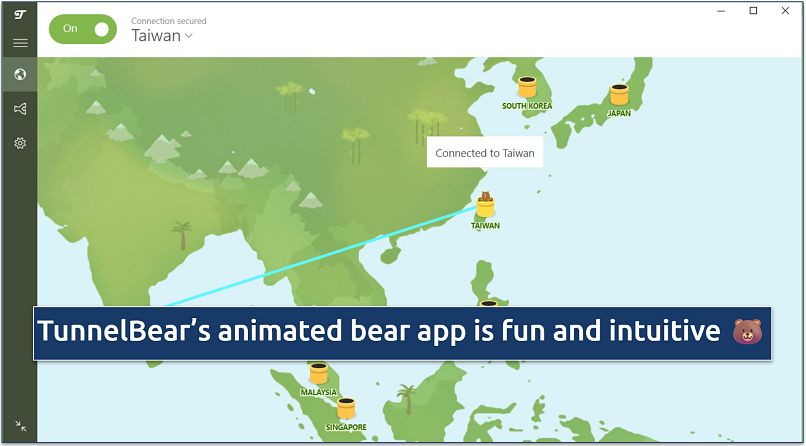 You can minimize TunnelBear to a simple toggle switch and server selection screen
You can minimize TunnelBear to a simple toggle switch and server selection screen
Its setup even adds a bit of fun with bear-themed instructions and puns. It took me less than 2 minutes to install the VPN on all the devices I tested, including Mac, Android, and Windows. TunnelBear also has fast short-distance speeds, according to our tests. The Fastest Tunnel feature automatically connected us to the best server — we experienced steady speeds with only 28% speed loss.
The GhostBear (obfuscation) functionality makes it one of the more reliable VPNs, as it’s able to go undetected on restrictive networks. To activate it, go to Settings > Connection > GhostBear. I was disappointed that it wasn’t available on iOS, though. You’ll find SplitBear in the same menu — a handy tool for saving bandwidth in China by letting you choose which apps use the VPN and which don’t.
A downside is the lack of a standard money-back guarantee; refunds are only available on a case-by-case basis, as stated on its website.
Useful Features
- Trusted Networks. You can add known networks to a safelist for automatic protection only on unfamiliar networks — a handy feature for those using China’s public WiFi, where security is generally low.
- Leak protection and VigilantBear (Kill Switch). Both features worked reliably in my tests, blocking any slip-ups that could expose my IP or private data.
- Encrypted Client Hello (ECH). This technology helps TunnelBear stay accessible in countries like China by encrypting DNS requests, making it harder for censors to block the site. It builds on the older ESNI feature and is currently available on Android.
- Easy-to-use, fun apps
- GhostBear setting obfuscates traffic
- Unlimited simultaneous devices
- No money-back guarantee
- Slow speeds on distant servers
- Based in Canada
5. Private Internet Access (PIA) — Local and Global Servers Give You Plenty of Options to Stay Connected in China
| Best Feature | One of the very few VPNs that offer a server location (even a virtual one) for China |
|---|---|
| Nearby Locations | China, Hong Kong, Macau, Mongolia, Taiwan, Vietnam |
| Security & Privacy | A customizable kill switch lets you control exactly when internet access is cut |
| Works With | Netflix, Max, Messenger, YouTube TV, HBO Go Asia, The Financial Times, Pinterest, and more |
PIA has the largest server network of all the China VPNs we listed — and it even includes a virtual server location for China. Since the server isn’t physically located in the country, PIA isn’t subject to local data laws and thus keeps your privacy intact. This means you can securely access Chinese sites without exposing your data to government requests.
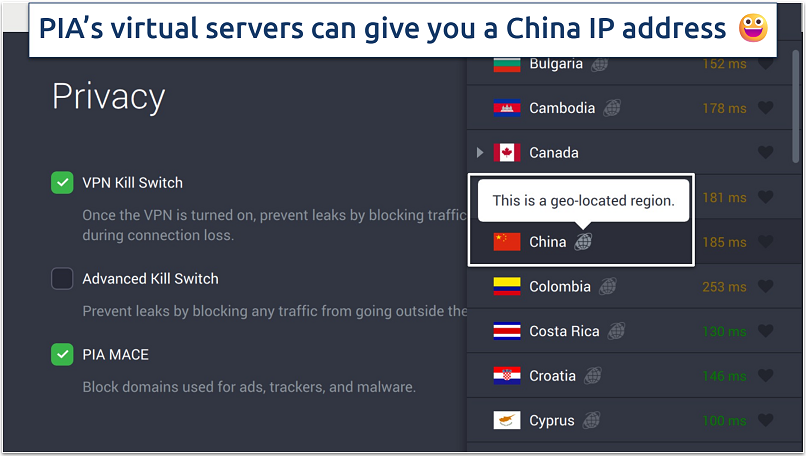 You can also enable MACE with one click to get rid of pop-up ads on Chinese sites
You can also enable MACE with one click to get rid of pop-up ads on Chinese sites
With PIA, you can connect unlimited devices in China. Perfect if you’ve got a bunch of gadgets or you’re traveling with family and everyone wants unfettered access to the internet. In our PIA tests, we experienced stable connections without any drops, even with 6 laptops and 10 mobile phones active.
The VPN doesn’t consistently work in China, but its website provides several workarounds to help maintain stable connections. Start by switching between the WireGuard and OpenVPN protocols. If that doesn’t help, try one of PIA’s Multi-Hop setups — either with the SOCKS5 proxy or Shadowsocks. Just note that this might affect speeds. As a last resort, you can try manual configuration files with detailed instructions on the PIA website.
It offers a 30-day money-back guarantee, so you can try it risk-free — and getting a refund is straightforward.
Useful Features
- Adjustable encryption. PIA lets you choose between two encryption levels with the OpenVPN protocol. AES 256-bit (the strongest available) is my go-to for online banking, but I switch to AES 128-bit for streaming as it offers better speeds. However, if speed is the main goal, I’d recommend the lightweight WireGuard protocol — it gave us the best results overall.
- Connection automation. This tells the app to automatically connect when certain conditions are met, like if you join a public WiFi network. This is really important no matter where you are in the world, but even more so in China.
- Many servers to choose from
- Customizable security settings
- Solid choice for torrenting
- Hit-or-miss customer support
- Tricky to navigate
Quick Comparison Table: China VPN Features
The table below highlights the key features of all the recommended VPNs for use in China and beyond. It shows whether each VPN has servers optimized for China and if they have an audited no-logs policy to help keep your data private.
I’ve included useful extras too — like how many servers each one has, if you can get a China IP address, what Chinese payment methods are supported, and whether they accept cryptocurrencies (handy if you’d rather not share too much personal info).
Editor's Note: We value our relationship with our readers, and we strive to earn your trust through transparency and integrity. We are in the same ownership group as some of the industry-leading products reviewed on this site: Intego, CyberGhost, ExpressVPN, and Private Internet Access. However, this does not affect our review process, as we adhere to a strict testing methodology.
Our Methodology for Choosing the Best VPN for China
We prioritized each VPN's ability to maintain stable, secure access to services like Netflix, Google, and Facebook from China. Connection speed and consistent performance across everyday activities were also key factors. We gave weight to server availability, especially in nearby countries, since these directly influence connection quality. The ability to download the VPN while inside the country — along with access to responsive customer support — was another important consideration.
With that in mind, consider a VPN with robust obfuscation and servers optimized for restrictive environments. Strong security and privacy features are equally important, including military-grade 256-bit encryption, a kill switch, leak protection, and a verified no-logs policy to keep your personal communications, search history, and online activity private. Mirror sites and responsive support accessible from inside China can also make a real difference when access gets tricky.
For more information on our thorough testing process, please visit our VPN testing methodology page. Our global team constantly updates VPN performance data to bring you the most reliable recommendations. If you’re interested in conducting your own evaluations, you can consider these factors.
Quick Guide: How to Use a VPN in China in 3 Easy Steps
- Download a VPN.
I recommend ExpressVPN because it has automatic obfuscation on all its servers and military-grade security to protect your privacy while you’re in China. It’s best to download it before arriving in the country because it can be a bit tricky once you’re already there. - Connect to a server.
If you’re using another VPN, make sure you enable any obfuscation settings, or your connection might fail. - Start browsing in China.
Now, you can use the internet safely and protect your privacy.
Can I Download a VPN in China?
You can, but it’s not always straightforward — especially if the VPN isn’t government-approved. Most independent VPN providers are blocked by the Great Firewall, meaning their websites and download pages are often inaccessible once you’re in the country. This makes it difficult to install or update a VPN from within China.
That said, a few international providers (like ExpressVPN) offer mirror websites (alternative URLs) that allow you to download the app from China. These links are frequently updated to stay ahead of blocks, but they’re not always easy to find on your own. It helps to reach out to the provider before you travel and ask for those links in advance.
App stores don’t make things any easier. Google Play and Amazon Appstore are blocked in China, and while the Apple App Store is available, you won’t find most VPN apps there unless they’ve been approved by the government.
If you’re planning a trip to China, your best option is to download and set up your VPN before arriving in China. It’s also worth saving a copy of the installation file or setup instructions on a USB drive or in cloud storage, just in case you need to reinstall the app later. You may also need to tweak a few settings to help it work well in the country. Some VPNs — like ExpressVPN — come pre-configured with settings designed for restrictive networks, so no manual changes are usually needed.
What About Using a Free VPN in China?
It can be challenging to find a free VPN that consistently works in China. The Great Firewall uses advanced filtering technology to block VPNs, and most free options lack the resources needed to stay ahead of these restrictions. Some VPNs on this list offer free plans, but they’re not guaranteed to reliably work without frequent disconnects or configuration issues.
Even if you do find a free VPN that works in China, you’ll likely face restrictions that limit its usefulness. Data caps on free plans are often too low to stream or browse extensively, and speeds are usually throttled, resulting in sluggish performance. Free VPNs often log user data to monetize their services, which is especially risky in restrictive regions like China. For these reasons, opting for a reputable paid VPN is generally a safer, more dependable choice.
Troubleshooting Tips: What if My VPN Stops Working in China?
If your VPN suddenly stops working in China, try these troubleshooting steps:
- Switch servers. Change to a different server, ideally one closer to China. Some servers are more stable than others on restrictive networks.
- Try a different protocol. Switch between available VPN protocols (like Lightway, OpenVPN, WireGuard, or IKEv2), as some may be less detectable than others.
- Enable obfuscation. Many VPNs have an obfuscation or stealth mode that disguises VPN traffic as regular web traffic, making it harder to block.
- Clear cache and restart. Clear your device’s cache, then restart it. Sometimes, temporary data can interfere with VPN connections.
- Use mobile data. If possible, connect over mobile data rather than public or local WiFi, which may have additional restrictions.
- Update the VPN app. Make sure you’re using the latest version of the app, as updates often include fixes for connection issues in restricted regions.
- Try manual configuration. Use manual configuration files, if your VPN provider offers them, for more stable connections within China.
If these tips don’t work, contact your VPN’s support team for advice, as they may have region-specific solutions.
Popular VPNs That Don’t Work Reliably in China
These VPNs may connect briefly or sporadically, but they experience too much downtime to be reliable.
- NordVPN. Often struggles with China’s restrictions and has difficulty maintaining a stable connection.
- Surfshark. Known for its features and stability elsewhere but is frequently blocked and unreliable in China.
- CyberGhost. This VPN rarely works within China, with most users experiencing high downtime and failed connections.
- IPVanish. Generally blocked by the Great Firewall, so it’s not dependable for use in China.
- Proton VPN. Efforts are underway to improve its performance in China, but for now, it remains hit-or-miss.
Using these VPNs in China will likely lead to connectivity issues, making them unsuitable for secure access. Customer support might help you with some service-specific troubleshooting tips, but efficacy isn’t guaranteed.
Are VPNs Legal in China?
The legal status of VPNs in China exists in a complex gray area that varies by region and circumstance. Only government-approved VPNs are officially permitted, but the reality of enforcement is more nuanced. Based on extensive research, there have been no documented cases of tourists facing legal penalties for personal VPN use in China.
Even Chinese citizens rarely encounter direct legal consequences for using VPNs for personal purposes. Instead of pursuing individual users, authorities typically focus on making VPN access more difficult through technical blocking measures.
However, there have been several notable enforcement cases, primarily targeting commercial VPN operations. According to CNN, in October 2017, a Shanghai court sentenced a developer surnamed Dai to a three-year suspended prison term and fined him 10,000 yuan for developing and selling VPN software1.
Also, The Guardian shared that in December 2017, the Pingnan County People's Court in Guangxi sentenced Wu Xiangyang to five and a half years in prison for "running an illegal business" after he sold VPN services through Taobao and his own website2.
Some provinces take a more aggressive stance through technical restrictions rather than legal punishment. There have been reports of local authorities temporarily suspending cellular service until VPN apps are removed from users' devices.
In these cases, individuals typically must visit a police station, delete the VPN apps, and have their devices checked before service is restored. Additionally, promoting or recommending unauthorized VPNs on Chinese social media platforms can attract unwanted attention from authorities. For more information, you can visit our detailed guide on the legal landscape of VPN usage in China.
FAQs on the Best China VPNs
Are domestic Chinese VPNs like V1VPN, Raptor VPN, or iKuuu VPN safe to use?
A few of these might work for basic security, but there aren’t any domestic VPN recommendations that I’d personally trust. Since these VPNs must follow Chinese regulations, they could be required to share user data with authorities. Plus, services like LetsVPN, V1VPN, Raptor VPN, and iKuuu VPN typically aren't transparent about their data handling practices or security measures.
International VPN providers based outside of China have more freedom to protect your privacy and maintain strict no-logs policies. For the best security, I recommend sticking with trusted international VPNs that have proven track records of protecting user data.
What speeds can I expect while using a VPN in China?
The #1 VPN on this list maintains consistently fast speeds even on highly restrictive networks like China's, thanks to its advanced obfuscation and speed-optimized protocol.
VPNs in China are naturally slower than usual because they need to do extra work. They hide traffic (through obfuscation) to avoid detection, and then push it through the Great Firewall's deep packet inspection. Plus, the Firewall actively tries to identify and block VPN connections, forcing traffic through additional security checks.
Users on Reddit and other forums report seeing slowdowns of 50–70% with most VPNs. But there are ways to improve your speeds — you should connect to nearby locations in Hong Kong, Japan, or Singapore instead of distant locations in Europe or the US. Redditors also suggest trying different protocols to find what works best with your connection.
What sites and apps are blocked in China?
China blocks many international websites and apps to maintain control over the information accessible within its borders. Websites blocked in China include Facebook, Google, WhatsApp, Netflix, LinkedIn, and Bloomberg. The restrictions are part of broader efforts to limit foreign influence, promote local alternatives, and align content with government regulations. The most reliable and safe way to access these sites and apps in China is through a VPN with robust obfuscation technology.
If you want to see whether a specific website is blocked in China, you can use this tool.
Which VPN servers should I use in China?
It’s best to use nearby servers for optimal speeds. Make sure to choose a VPN that offers servers close to Mainland China. Most VPNs (including the ones on this list) don’t offer servers in Mainland China because the government would either shut them down or force the providers to hand over user data, which renders them unsafe.
That said, you can still experience fast speeds by connecting to nearby locations (like Hong Kong, South Korea, and Taiwan). All the VPNs listed above have servers in or close to Mainland China, which I recommend using to keep your speed loss to a minimum.
Is there a VPN that offers Chinese IP servers?
Yes, one of the VPNs on our list offers servers with Chinese IP addresses. Having physical servers within the country can introduce privacy risks, as local regulations may require data monitoring. However, the servers provided by such a VPN are virtual (located outside China) and can still give you a reliable Chinese IP address.
Are there alternatives to using a VPN in China?
Yes, there are alternatives to using a VPN in China, but VPNs remain the most dependable option for secure internet access. Alternatives include using proxies, which can mask your IP address, but they may not provide the same level of security and privacy. Another option is using SSH tunnels or Shadowsocks, which can encrypt your connection. However, they require technical knowledge to set up and maintain.
Some users also turn to Tor, a network that anonymizes browsing. However, its effectiveness in China is limited by strict censorship, and the connection is often very slow due to the multiple relay points it uses.
Is LetsVPN a reliable option for China?
LetsVPN is a domestic Chinese VPN that some users report can work in China, but there’s no guarantee of consistent performance. Operating under Chinese law means it may comply with local regulations, which can pose privacy risks. While it might provide access to certain content, this compliance could compromise your data security and online privacy. For better protection and reliability, I recommend using a well-regarded international VPN with strong privacy features.
Get the Best VPN for China Today
Finding a trustworthy VPN that works reliably in China can be difficult because the country has increased its crackdowns on VPNs. The Great Firewall only permits government-approved VPNs, which the state heavily monitors. Plus, because China updates its GFW technology all the time, even the most reliable VPNs don’t work 100% of the time.
That said, a few independent services have been proven to work there, and all the VPNs on this list are designed to work on restrictive networks. Additionally, they can access content in HD and 4K from anywhere while maintaining a safe and private connection. Of the group, ExpressVPN stands out for its strong anti-detection technology and consistently fast speeds across its entire network.
References
- https://edition.cnn.com/2018/10/10/asia/china-vpn-censorship-intl/index.html/
- https://www.theguardian.com/world/2017/dec/22/man-in-china-sentenced-to-five-years-jail-for-running-vpn/


Your online activity may be visible to the sites you visit
Your IP Address:
216.73.216.5
Your Location:
US, Ohio, Columbus
Your Internet Provider:
Some sites might use these details for advertising, analytics, or tracking your online preferences.
To protect your data from the websites you visit, one of the most effective steps is to hide your IP address, which can reveal your location, identity, and browsing habits. Using a virtual private network (VPN) masks your real IP by routing your internet traffic through a secure server, making it appear as though you're browsing from a different location. A VPN also encrypts your connection, keeping your data safe from surveillance and unauthorized access.
Leave a comment
Other VPNs that have recently proven unreliable to work in China are Ivacy VPN, PrivadoVPN, Total VPN, TorGuard, Hotspot Shield, and AtlasVPN.Can you explain the reason and relative test result?
I may verify PIA does also not work.Do you think the most possible reason why vpn is banned by china is they come from America and their allies? Since EXPRESS is known by their adware and malware.In contrast, if vpn providers provide the data of Chinese's user, will the green traffic light have been lasting for ever?
I use v1vpn and it does work really well, i recommed it
Just to be clear, unlike Hong Kong and Macau, Taiwan is NOT part of China and doesn't block any VPN services and internet traffic.
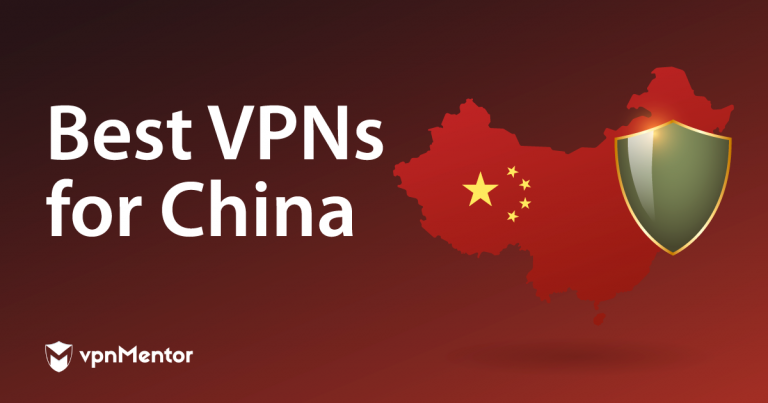


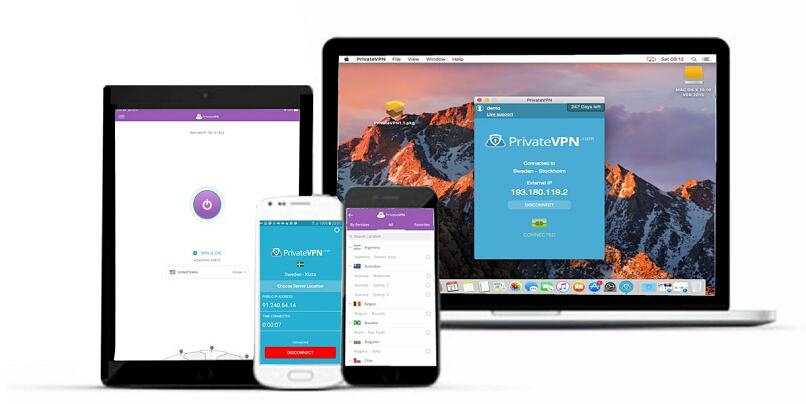
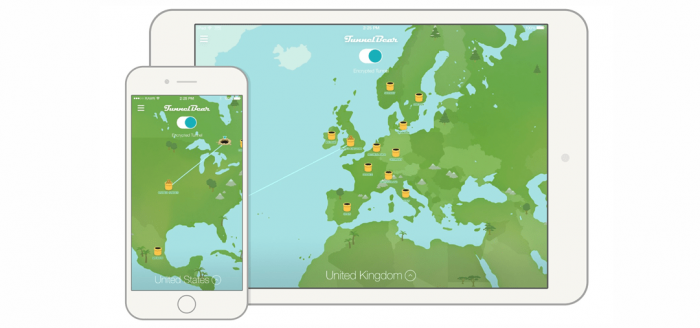



Please, comment on how to improve this article. Your feedback matters!